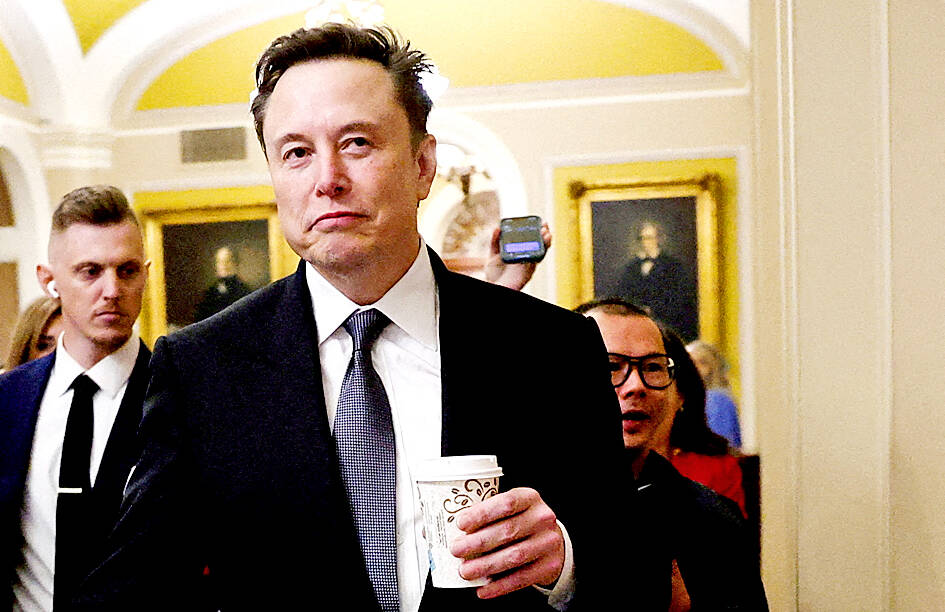The US Securities and Exchange Commission (SEC) has sued billionaire Elon Musk, saying he failed to disclose his ownership of Twitter stock in a timely manner in early 2022, before buying the social media site.
As a result, the SEC alleges, Musk was able to underpay “by at least US$150 million” for shares he bought after he should have disclosed his ownership of more than 5 percent of Twitter’s shares. Musk bought Twitter in October 2022 and later renamed it X.
Musk started amassing Twitter shares in early 2022, and by March of that year, he owned more than 5 percent. At this point, the complaint says, he was required by law to disclose his ownership, but he failed to do so until April 4, 11 days after the report was due.

Photo: Reuters
Musk’s lawyer, Alex Spiro, said in a statement that the lawsuit “is an admission by the SEC that they cannot bring an actual case” since Musk has “done nothing wrong.” He called the lawsuit a “sham.”
“As the SEC retreats and leaves office — the SEC’s multi-year campaign of harassment against Mr Musk culminated in the filing of a single-count ticky tack complaint against Mr Musk under Section 13(d) for an alleged administrative failure to file a single form — an offense that, even if proven, carries a nominal penalty,” Spiro added.
After Musk signed a deal to acquire Twitter in April 2022, he tried to back out of it, prompting the firm to sue him to force him to go through with the acquisition.
The has SEC said that starting in April 2022, it authorized an investigation into whether any securities laws were broken in connection with Musk’s purchases of Twitter stock, and his statements and SEC filings related to the company.
Before it filed the lawsuit, the SEC went to court in an attempt to compel Musk to testify as part of an investigation into his purchase of Twitter.
SEC Chairman Gary Gensler, plans to step down from his post on Monday next week, and it is not clear if the new administration would continue the lawsuit.

Taiwan Semiconductor Manufacturing Co (TSMC, 台積電) would not produce its most advanced technologies in the US next year, Minister of Economic Affairs J.W. Kuo (郭智輝) said yesterday. Kuo made the comment during an appearance at the legislature, hours after the chipmaker announced that it would invest an additional US$100 billion to expand its manufacturing operations in the US. Asked by Taiwan People’s Party Legislator-at-large Chang Chi-kai (張啟楷) if TSMC would allow its most advanced technologies, the yet-to-be-released 2-nanometer and 1.6-nanometer processes, to go to the US in the near term, Kuo denied it. TSMC recently opened its first US factory, which produces 4-nanometer

PROTECTION: The investigation, which takes aim at exporters such as Canada, Germany and Brazil, came days after Trump unveiled tariff hikes on steel and aluminum products US President Donald Trump on Saturday ordered a probe into potential tariffs on lumber imports — a move threatening to stoke trade tensions — while also pushing for a domestic supply boost. Trump signed an executive order instructing US Secretary of Commerce Howard Lutnick to begin an investigation “to determine the effects on the national security of imports of timber, lumber and their derivative products.” The study might result in new tariffs being imposed, which would pile on top of existing levies. The investigation takes aim at exporters like Canada, Germany and Brazil, with White House officials earlier accusing these economies of

Teleperformance SE, the largest call-center operator in the world, is rolling out an artificial intelligence (AI) system that softens English-speaking Indian workers’ accents in real time in a move the company claims would make them more understandable. The technology, called accent translation, coupled with background noise cancelation, is being deployed in call centers in India, where workers provide customer support to some of Teleperformance’s international clients. The company provides outsourced customer support and content moderation to global companies including Apple Inc, ByteDance Ltd’s (字節跳動) TikTok and Samsung Electronics Co Ltd. “When you have an Indian agent on the line, sometimes it’s hard

PROBE CONTINUES: Those accused falsely represented that the chips would not be transferred to a person other than the authorized end users, court papers said Singapore charged three men with fraud in a case local media have linked to the movement of Nvidia’s advanced chips from the city-state to Chinese artificial intelligence (AI) firm DeepSeek (深度求索). The US is investigating if DeepSeek, the Chinese company whose AI model’s performance rocked the tech world in January, has been using US chips that are not allowed to be shipped to China, Reuters reported earlier. The Singapore case is part of a broader police investigation of 22 individuals and companies suspected of false representation, amid concerns that organized AI chip smuggling to China has been tracked out of nations such